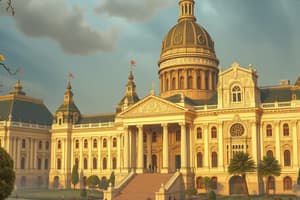Podcast
Questions and Answers
Which branch of government is responsible for interpreting and enforcing laws?
Which branch of government is responsible for interpreting and enforcing laws?
- Administration
- Legislature
- Judiciary (correct)
- Executive
In which system does the state control all aspects of society?
In which system does the state control all aspects of society?
- Democracy
- Totalitarianism (correct)
- Authoritarianism
- Federalism
What are initiatives aimed at managing the economy, such as taxation and trade policies, classified as?
What are initiatives aimed at managing the economy, such as taxation and trade policies, classified as?
- Social policies
- Foreign policies
- Economic policies (correct)
- Environmental policies
Which function of government involves ensuring the protection of citizens and borders?
Which function of government involves ensuring the protection of citizens and borders?
In which system of government are citizens able to participate directly in decision-making?
In which system of government are citizens able to participate directly in decision-making?
What is the basis of federalism in a system of government?
What is the basis of federalism in a system of government?
What type of government is characterized by a small, privileged ruling class?
What type of government is characterized by a small, privileged ruling class?
In which government type does the ruler hold absolute power and may exercise it in a cruel or oppressive manner?
In which government type does the ruler hold absolute power and may exercise it in a cruel or oppressive manner?
What system of government has the supreme power resting with the people, who may participate directly or through elected representatives?
What system of government has the supreme power resting with the people, who may participate directly or through elected representatives?
Which form of government has power held by those with military or martial virtues?
Which form of government has power held by those with military or martial virtues?
What government type recognizes a deity as the supreme civil ruler?
What government type recognizes a deity as the supreme civil ruler?
Which system of government is characterized by the state controlling all aspects of society and prohibiting opposition?
Which system of government is characterized by the state controlling all aspects of society and prohibiting opposition?
Flashcards are hidden until you start studying
Study Notes
Government
Types of Government
A government is a system of social control that ensures the implementation of laws and policies within a community. Historically, there have been various forms of government, including but not limited to:
- Monarchy: A form of government in which a monarch holds supreme power and often rules unhindered, without a constitution or legally organized opposition.
- Aristocracy: A type of government controlled by a small, privileged ruling class.
- Timocracy: A government in which power is held by those with military or martial virtues.
- Oligarchy: A form of government in which a small group of people holds power and makes decisions for the community.
- Democracy: A system in which the supreme power rests with the people, who may participate directly or through elected representatives.
- Theocracy: A government in which a deity is recognized as the supreme civil ruler, but the laws are interpreted by ecclesiastical authorities.
- Tyranny: A form of government in which the ruler holds absolute power and may exercise it in a cruel or oppressive manner.
- Totalitarianism: A system in which the state controls all aspects of society, including political, economic, and cultural life, and opposition is prohibited.
Branches of Government
Governments are typically organized into distinct institutions, each with particular functions, duties, and responsibilities. The distribution of powers between these institutions varies between governments. Some common branches of government include:
- Legislature: The branch responsible for making laws, often composed of elected representatives.
- Executive: The branch responsible for implementing laws and policies, often led by a head of state, such as a president or prime minister.
- Judiciary: The branch responsible for interpreting and enforcing laws, often composed of judges and courts.
Political Systems
Modern political systems can be classified into three main categories: democracies, totalitarian regimes, and authoritarian regimes, with various hybrid forms.
- Democracy: A system in which the supreme power is retained by the people, who may participate directly or through elected representatives.
- Totalitarianism: A system in which the state controls all aspects of society and opposition is prohibited.
- Authoritarianism: A system in which the government holds significant power and controls the people.
Government Policies
Government policies are decisions and actions taken by governments to address various issues and shape society. These can include:
- Economic policies: Regulations and initiatives aimed at managing the economy, such as taxation, trade policies, and fiscal policies.
- Social policies: Initiatives aimed at addressing social issues, such as education, healthcare, and welfare.
- Environmental policies: Decisions and actions aimed at protecting the environment and mitigating climate change.
- Foreign policies: Strategies and actions taken by governments in international relations, including diplomacy, military actions, and international cooperation.
Functions of Government
The primary functions of a government include:
- Law-making: Governments create laws to govern society and maintain order.
- Law enforcement: Governments enforce laws and protect citizens from harm.
- Administration: Governments manage public services and infrastructure.
- Defense and security: Governments ensure the protection of their citizens and borders.
- Economic management: Governments manage the economy and promote economic growth.
Federalism
Federalism is a system of government in which sovereignty is constitutionally divided between the central government and constituent regions, allowing for shared rule and self-governance.
Monarchy
A monarchy is a system of government in which a monarch is guided by a constitution that defines their rights, duties, and responsibilities.
Unitary System of Government
A unitary system of government is one in which power is concentrated in a central government, with limited or no powers delegated to regional or local governments.
Studying That Suits You
Use AI to generate personalized quizzes and flashcards to suit your learning preferences.




